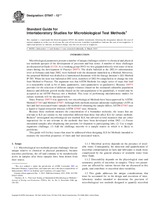We need your consent to use the individual data so that you can see information about your interests, among other things. Click "OK" to give your consent.
ASTM D7847-12e1
Standard Guide for Interlaboratory Studies for Microbiological Test Methods (Includes all amendments And changes 6/28/2017).
Automatically translated name:
Standard Guide for Interlaboratory Studies for Microbiological Test Methods
STANDARD published on 1.12.2012
The information about the standard:
Designation standards: ASTM D7847-12e1
Note: WITHDRAWN
Publication date standards: 1.12.2012
SKU: NS-583343
The number of pages: 5
Approximate weight : 15 g (0.03 lbs)
Country: American technical standard
Category: Technical standards ASTM
The category - similar standards:
Microbiology in generalLubricants, industrial oils and related products
Annotation of standard text ASTM D7847-12e1 :
Keywords:
bioburden, biodeterioration, biodiesel, biofuels, biomass, diesel, fuel, fuel-oil, fungi, gasoline, interlaboratory studies (ILS), microbial contamination, microbiology, microorganisms,, ICS Number Code 07.100.01 (Microbiology in general), 75.100 (Lubricants, industrial oils and related products)
Additional information
| 1. Scope | ||||||||||||||||||||||||||||||
|
1.1 Microbiological test methods present challenges that are unique relative to chemical or physical parameters, because microbes proliferate, die off and continue to be metabolically active in samples after those samples have been drawn from their source. 1.1.1 Microbial activity depends on the presence of available water. Consequently, the detection and quantification of microbial contamination in fuels and lubricants is made more complicated by the general absence of available water from these fluids. 1.1.2 Detectability depends on the physiological state and taxonomic profile of microbes in samples. These two parameters are affected by various factors that are discussed in this guide, and contribute to microbial data variability. 1.2 This guide addresses the unique considerations than must be accounted for in the design and execution of interlaboratory studies intended to determine the precision of microbiological test methods designed to quantify microbial contamination in fuels, lubricants and similar low water-content (water activity <0.8) fluids. 1.3 This standard does not purport to address all of the safety concerns, if any, associated with its use. It is the responsibility of the user of this standard to establish appropriate safety and health practices and determine the applicability of regulatory limitations prior to use. |
||||||||||||||||||||||||||||||
| 2. Referenced Documents | ||||||||||||||||||||||||||||||
|
Similar standards:
Historical
1.4.2012
Historical
1.1.2011
Historical
1.10.2010
Historical
1.4.2008
Historical
1.4.2012
Historical
1.8.2014
We recommend:
Technical standards updating
Do you want to make sure you use only the valid technical standards?
We can offer you a solution which will provide you a monthly overview concerning the updating of standards which you use.
Would you like to know more? Look at this page.



 ASTM E2196-12
ASTM E2196-12 ASTM E2197-11
ASTM E2197-11 ASTM E2198-10
ASTM E2198-10 ASTM E2199-08e1
ASTM E2199-08e1 ASTM E2562-12
ASTM E2562-12 ASTM E2722-14
ASTM E2722-14
 Cookies
Cookies
